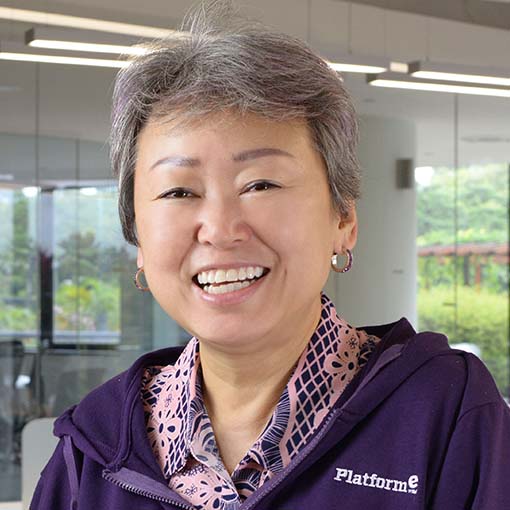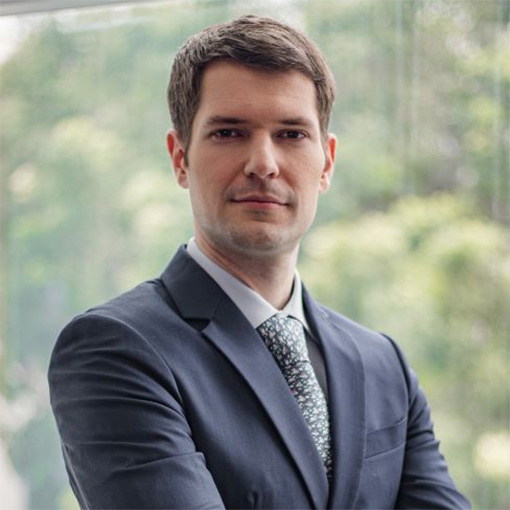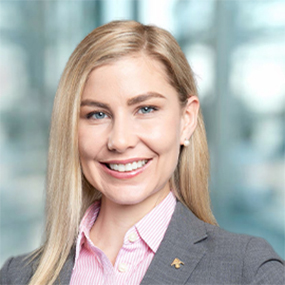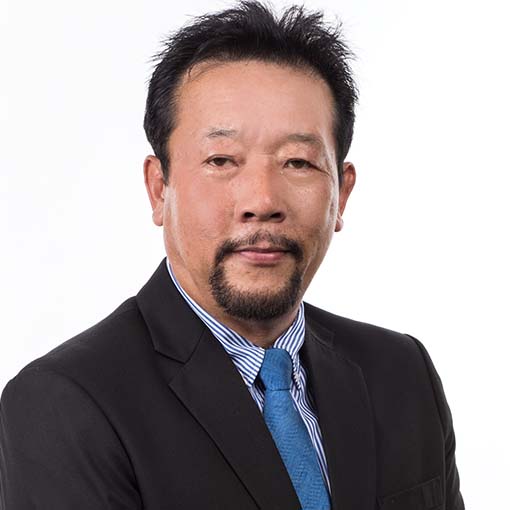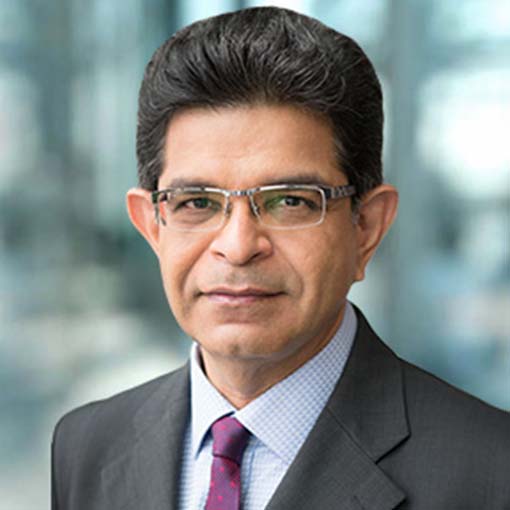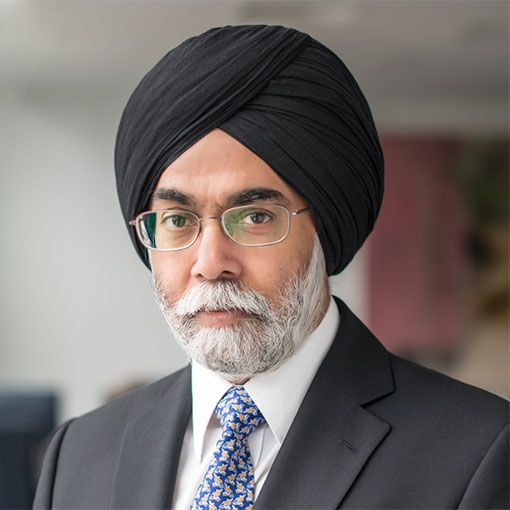A career-friendly format
Advance your EMBA aspirations while managing your career with minimal disruption. The NUS EMBA is structured into six segments of one-to-two-week sessions held over 15 months. This convenient format enables you to focus on learning and networking during the two-week sessions, then return to work to put what you have learned into practice for real-time impact.
37 to 60 in-country days across 15 months
10 Core Courses
6 Electives (minimum)
Flexible options during & in-between segments

15 months*
In-person segment duration
*Online pre-segment classes will start approximately 1 month prior to each segment. Attendance is compulsory.

6 residential segments
Every 2-3 months

1-2 Weeks
Per residential segment
One-week
Short global exchanges
Year
01
May
Singapore
8-12 days
– Marketing Strategy
– Accounting & Information Management
– *Electives
*The pre-segment online classes will be held on Saturdays in April. The attendance is compulsory.
Aug
Jakarta & Singapore
4-13 days
– Financial Management
– Electives
Nov
Shanghai & Tokyo
7-12 days
– Leadership in the Era of Disruption
– Economic Analysis for Managers
– Electives
Year
02
Feb
Dubai & Bangalore
9-12 days
– Business Analytics and Decision Making
– Strategy
– Electives
May
Singapore
6-9 days
– Managing Organisation
– Value Chains, Logistics and Operations
– Electives
Aug
Singapore & Bangkok
3-10 days
– Asia and Global Economy
– Electives
Global exchange programmes
Through our short global exchange programmes, participants are able to take up select electives offered by our partner schools.
Year 1
- June: Global Network Week (GNW) electives in SingaporeYear 2
- March/April: Esade, CEIBS, University of California- June: Global Network for Advanced Management (GNAM), CEIBS, Esade, Peking University, ESSEC Business School, University of Mannheim
NUS EMBA Global Exchanges
Through our short global exchange programs, participants are able to take up selected electives offered by our partner schools.
Global Exchange Experience
| CAMPUS (F2F) or ONLINE | Elective | UNITS |
| Esade (Madrid) | B2B Growth Strategy | 2 |
| From Financial Analysis to Visualization | 2 | |
| Leading in Times of Crisis | 2 | |
| Esade (Online) | Business Transformation: AI and IoT Enabling Technologies | 2 |
| CEIBS (Shanghai) | China Within the World: Business-Government Strategy in the Global Arena | 2 |
| CEIBS (Beijing) | Raising Funds To Accelerate Growth in a Global Environment: Venture Capital, Private Equity, And IPO/M&As | 2 |
| CAMPUS (F2F) or ONLINE | Elective | UNITS |
| Esade (Barcelona) | Advanced Managerial Action | 2 |
| Mergers & Acquisitions (2nd ed.) | 2 | |
| University of California Berkeley | Bay Area Innovation and Entrepreneurship | 4 |
| CAMPUS (F2F) or ONLINE | Elective | UNITS |
| Esade (Online) | Frictionless Marketing & Omnichannel Strategy | 2 |
| York University | Intelligent Innovation Ecosystem Design | 4 |
| Peking University | Doing Business in China (Conducted in English) | 2 |
| Global Network Week | Please click on the link (https://globalnetwork.io/) for the various programmes offered. | |
| Esade (Madrid) | Sales Management (2nd ed.) | 2 |
| Seoul National University | Doing Business in Korea | 4 |
| CEIBS (Shanghai) | Negotiation | 2 |
| ESSEC Business School | The Global Manager in Europe | 7 |
| University of Mannheim | Entrepreneurship and Innovation – Crowdfunding | 3 |
Global insights with an Asia Pacific foundation
The NUS Executive MBA immerses participants in some of the world’s most influential business hubs – Singapore, Dubai, Bangkok, Shanghai, Shenzhen, Mumbai, Tokyo, and Jakarta. This curated selection of destinations brings participants a balanced perspective on established powerhouses and fast-growing markets, anchored by our commitment to “Leading from Asia.”
Global immersion beyond APAC
The NUS Executive MBA extends learning beyond Asia Pacific with short exchange opportunities in renowned global business hubs across Asia, the US, and Europe. These exchanges – hosted by prestigious partner schools such as Berkeley Haas, Yale SOM, WHU in Germany, IMD in Switzerland, and IE Business School in Spain – offer intensive, one-week modules tailored to the region’s unique business landscape. This global reach allows participants to gain additional insights and perspectives, enriching their learning journey and broadening their impact as global leaders.
Flexible learning format
Our 25:75 blended learning model combines 25% online (both synchronous and asynchronous) with 75% in-person engagement. This approach provides flexibility to balance your studies and professional commitments, while maximizing in-class time for rich, collaborative discussions. It allows for enhanced overall learning with less time away from the office, enabling you to absorb and apply knowledge effectively between segments.
Course preparation typically begins about one month before each segment, involving 8 hours of asynchronous learning alongside individual and group assignments. Each segment spans one to two weeks, featuring in-person classes and immersive learning experiences.
Our wide range of electives are conducted in in-person (during segments), and online, dual mode, and hybrid formats (in between segments). This gives you greater flexibility over when and how you learn.
| Pre-segment (∼1 month) |
Segment (~12 days) |
Post-segment (∼1 month) |
|---|---|---|
| Meet faculty 8-hr asynchronous learning / online classes to cover fundamental content | F2F Classes + Immersive Learning | Assignments |
In-person segment experience
| 10 hours a day | Accommodation options for international participants |
Each in-person day spans 10 hours, and in-class learning is augmented by immersive experiences such company visits, guest speakers, alumni networking, and cultural activities. Overseas segments are hosted in conference-equipped hotels, while Singapore sessions take place in NUS Executive Rooms, with on-campus accommodation available for international participants on a first-come-first-serve basis.
The NUS EMBA Learning Model
Becoming a future-ready leader
Eight capabilities to lead with confidence, clarity, purpose, and global impact
In today’s fast-moving and interconnected world, senior leaders face constant disruption, growing complexity, and rising demands from diverse stakeholders. Thriving in this environment requires more than business acumen — it calls for strategic vision, analytical precision, people leadership, and a deeply rooted sense of purpose.
The NUS EMBA Learning Model is a structured, future-facing framework designed to build these leadership strengths. At its core is the Leadership & Growth Mindset, supported by eight essential capability pillars that define how our curriculum is designed and delivered. Together, they equip you to lead with global agility, drive innovation and growth, and deliver meaningful impact — in any context.
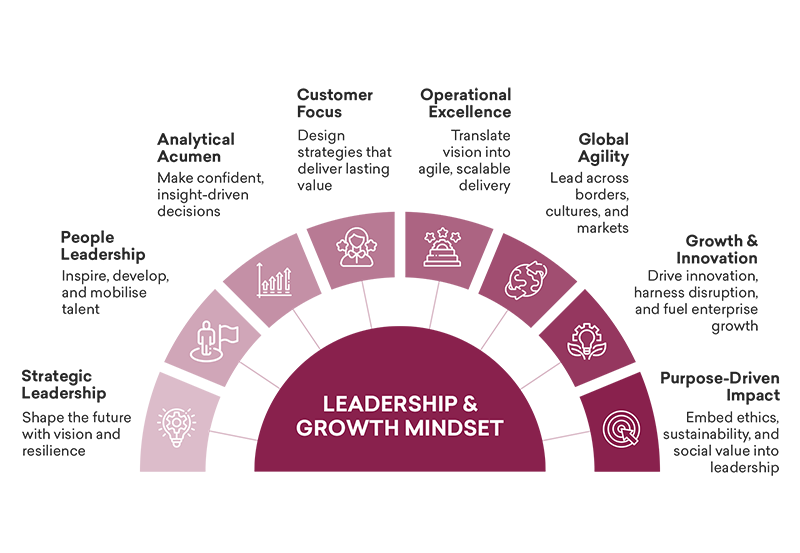
Strategic Leadership
Shape the future with vision and resilience
In a world shaped by disruption and shifting power dynamics, leaders must rise above the immediate and chart a course for long-term, purpose-driven success. This capability equips you to think strategically, connect macroeconomic and geopolitical trends to business impact, and govern with foresight. You’ll strengthen your ability to drive system-level transformation — from scenario planning to boardroom influence.
Courses
- Strategy
- Asia and the Global Economy
- Futures Thinking and Scenario Planning (Elective)
- Demystifying Board Directorship (Elective)
People Leadership
Inspire, develop, and mobilise talent
Exceptional leaders don’t just manage — they empower. This pillar helps you grow your capacity to lead through complexity by building trust, fostering high-performance cultures, and developing others. You’ll strengthen your emotional intelligence, leadership presence, and ability to influence across levels and contexts, equipping you to guide individuals and organisations through transformation.
Courses
- Managing Organisations
- Leadership in the Era of Disruption
- Future of Work (Elective)
- Communications, Influence and Negotiations (Elective)
Analytical Acumen
Make confident, insight-driven decisions
Executives today face a constant stream of data, uncertainty, and complexity. This capability empowers you to cut through the noise — combining financial fluency, microeconomic reasoning, and business analytics to make better strategic choices. You’ll build the skills to interpret financial information, understand market dynamics, and apply analytical thinking to spot opportunities, assess risks, and act with precision.
Courses
- Business Analytics and Decision Making
- Accounting and Information Management
- Financial Management
- Economic Analysis for Managers
Customer Focus
Design strategies that deliver lasting value
Enduring success begins with a deep understanding of those you serve. This capability develops your ability to anticipate evolving customer, market, and stakeholder needs — and turn those insights into distinctive strategies, services, and experiences. You’ll explore the art and science of customer strategy, service innovation, and value proposition design to build competitive advantage in a fast-changing world.
Courses
- Marketing Strategy
- Service Management (Elective)
Operational Excellence
Translate vision into agile, scalable delivery
Turning strategy into execution requires more than process efficiency — it demands systems thinking, risk awareness, and ecosystem coordination. This pillar strengthens your ability to manage value chains, navigate operational complexity, and orchestrate scalable platforms that support long-term growth. You’ll explore how to deliver performance through smart operations, contractual clarity, and enterprise risk management.
Courses
- Value Chains, Logistics and Operations
- Ecosystem Enterprise Risk Management (Elective, Online)
- Contracts: Understanding Terms and Managing Risks (Elective)
Global Agility
Lead across borders, cultures, and markets
In today’s multipolar world, global leadership requires more than international presence — it demands cultural intelligence, strategic adaptability, and geopolitical insight. This pillar prepares you to lead confidently across regions by deepening your understanding of regional dynamics, cross-cultural collaboration, and global strategy execution. You’ll strengthen your ability to navigate complexity and unlock opportunities across borders, particularly in the fast-evolving Asia-Pacific landscape.
Courses
- International Business and Internationalisation (Elective)
- Winning Strategy in Asia (Elective)
- Navigating Asia’s Geostrategic Landscape (Elective, Online)
Purpose-Driven Impact
Embed ethics, sustainability, and social value into leadership
In an era of rising stakeholder expectations, leading with purpose is not optional — it’s a competitive advantage. This pillar equips you to integrate ESG principles, ethical governance, and long-term thinking into your leadership approach. You’ll explore how to align business performance with environmental, social, and governance outcomes to drive impact that is both meaningful and measurable.
Courses
- ESG Strategies and Corporate Governance (Elective)
- Sustainability Reporting and ESG Investing (Elective, Online)
Growth & Innovation
Drive innovation, harness disruption, and fuel enterprise growth
Thriving in an era of constant change requires more than stability — it demands the curiosity to explore, the mindset to innovate, and the courage to act. This pillar equips you with the strategic tools to identify emerging technologies, test new business models, and scale innovation across industries. Whether you're driving change from within or launching new ventures, you’ll gain the skills to turn disruption into opportunity.
Courses
- AI: From Basics to Execution (Elective)
- Blockchain Applications in Finance (Elective)
- Technology, Innovation and Entrepreneurship (Elective)
Schedule and modules are subject to change.
Learn from the best minds
Our 140-strong faculty hail from internationally renowned universities and hold extensive and diverse consulting experience across various industries. Movers and shakers in their own right, they are powerful influencers for new thinking and will bring you the best management theories and practices from the East and West.


